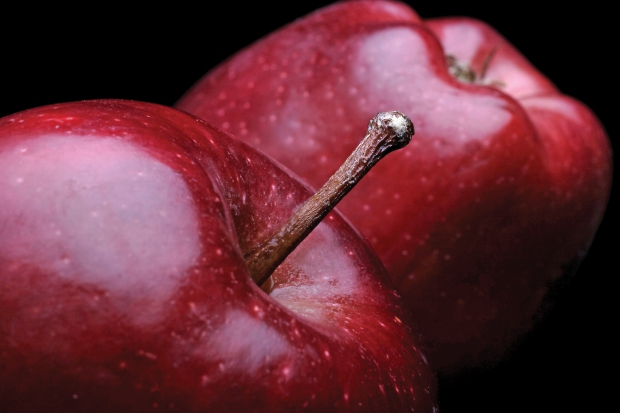
Red Delicious apples. (Courtesy Tracy Hebden, LRPS.)
Good news came to Washington’s apple industry today when U.S. Department of Agriculture officials announced the immediate reopening of China’s market to Washington Red and Golden Delicious apples. It’s good timing as growers are wrapping up harvest of the largest crop on record, which some believe will be around 150 million cartons.
Red and Golden Delicious apples are the only two varieties from the United States that have ever been allowed into China. But shipments were stopped two years ago when the Chinese government closed the market to Washington Red and Golden apples due to interception of three species of fungi that cause postharvest decay. The Chinese have claimed that the three fungi are not found in their country.
Since then, negotiations have been underway. The Northwest Horticultural Council and Northwest Fruit Exporters have worked closely with USDA’s Animal and Plant Health Inspection Service to alleviate China’s concerns that Washington apples could spread decay organisms to their domestic apple industry.
Washington State produces more than 90 percent of US apple exports.
Earlier this year, Washington’s apple industry agreed to an export work plan as a condition of exporting apples to China. The export protocol is detailed and involves growers following Cooperative Extension guidelines for monitoring and managing speck rot (Phacidiopycnis washingtonesis), spharopsis rot (Sphaeropsis pyriputrescens), and bull’s eye rot (Neofabraea perennans) in the orchard, drenching apples upon arrival at the packing house or fogging cold storage rooms with fungicides, collecting 300 apples from each grower lot at the packing house and putting the sample through a cold treatment for 40 days at 0°C or 90 days at 3.3°C before inspection and prior to packing, and inspection of 2 percent of the total number of boxes from the grower lot before shipment.
(Read our August story that details the protocol.)
The export work plan will be in place for one year only, said Dr. Michael Willett of the Northwest Horticultural Council.
Though the export protocol is onerous, given the size of this year’s crop, David Anderson of Northwest Fruit Exporters says shippers have anxiously waited for the market to reopen. When the market was last open, there were 90 Washington fruit companies that were registered to ship to China, he said.
China was the industry’s fourth largest export market during the 2010-11 marketing year when Washington shipped more than three million 40-pound cartons there, according to the Washington Apple Commission.
“Clearly, China has great potential for Washington apples, with an increasing middle class willing to purchase high quality apples,” stated Todd Fryhover, president of the commission. “This year, with our record crop, Chinese consumers will again have opportunity to enjoy Washington apples and our growers will have access to this important market.”
Next week, Willett, vice president for scientific affairs at the Hort Council, will meet with U.S. and Chinese officials in China for preliminary discussions regarding opening China to all varieties of U.S. apples and importation of Chinese apples to the United States. Formal bilateral discussions between the two countries are scheduled for January.
Shippers interested in exporting to China should contact Northwest Fruit Exporters at (509) 576-8004.






I Melissa , im glad that Us apples can EXPORT to china, its good news FOR everybody.
Saludos y buenas noches.
Are you not affraid of Chinese apples , juicy and crispy Fujis, entering the US market at lower prices ?